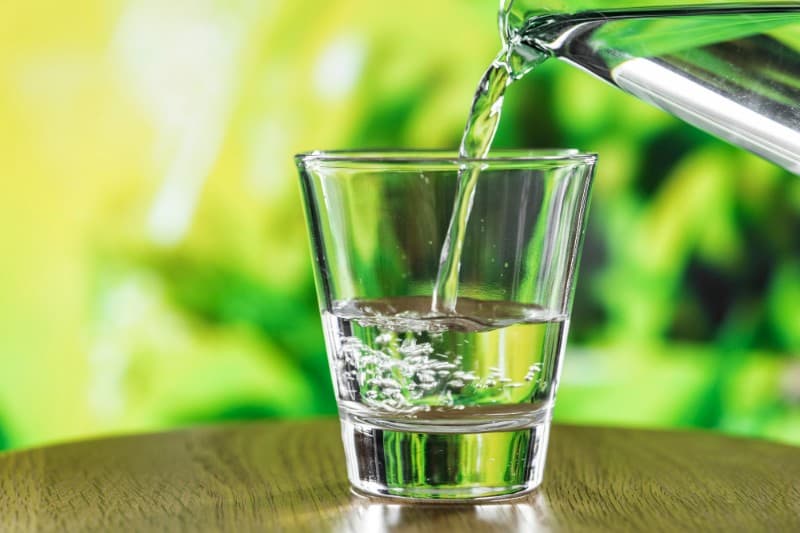Can Water Aid With Weight Loss?
The idea that drinking water helps you lose weight is backed up by a lot of research. Additionally, hydration is important for several processes that contribute to weight reduction, such as digestion and muscle activity.
However, the extent to which water consumption affects weight reduction is still unknown in the medical community.
There are six reasons why drinking water may aid in weight loss. Although several studies indicate a good relationship between increased water consumption and weight loss, researchers are still unsure of why drinking more water helps a person lose weight.
6 Reasons Why Drinking Water Supports Weight Loss

1. Natural Appetite Suppressant Water
Water consumption may support weight loss. The brain receives signals from the stomach telling it to stop eating once it is satisfied. By helping to fill up the stomach, water can help people feel fuller longer and eat fewer calories.
Another scenario is when someone believes they are hungry when they are truly thirsty. To avoid mindless snacking, try drinking a glass of water before reaching for a portion of food.
In a 2014 study, 50 overweight women drank 500 milliliters (mL) of water in addition to their usual water intake for 8 weeks. They did this before breakfast, lunch, and supper. The subjects’ body weight, body fat, and body mass index all decreased. Additionally, they reported reduced appetite.
2. Water Accelerates Fat Burning
According to some research, drinking water can aid in calorie burning.
In a 2014 study, 12 participants who drank 500 mL of cold or room-temperature water noticed an increase in energy use. In the 90 minutes after consuming the water, they burned 2 to 3 percent more calories than usual. The body’s resting energy expenditure, or the number of calories burned while at rest, may also momentarily increase with the consumption of water.
Since the body burns calories to heat the water for digestion, drinking cold water may increase the benefits of water’s ability to burn calories.
3. Water Aids In The Body’s Waste Removal
Dehydration prevents the body from properly eliminating waste such as urine or feces.
The kidneys retain vital nutrients and electrolytes while filtering pollutants and waste with the aid of water. The kidneys retain fluid when the body is dehydrated. Constipation and stiff or lumpy feces are other symptoms of dehydration. Water facilitates the movement of waste by easing or softening stiff stools.
Water also aids in the body’s recovery from digestive issues, including indigestion and diarrhea. People who accumulate waste in their bodies may experience bloating, swelling, and fatigue. The waist might grow larger as a result of bloating. A smart approach to prevent retaining waste, which could result in a few extra pounds, is to stay hydrated.
4. Water Is Essential For Fat-burning

The body cannot adequately digest stored fat or carbohydrates without water.
Lipolysis is the term used to describe the breakdown of fat. In the first stage of this procedure, hydrolysis, glycerol, and fatty acids are produced from the interaction of water molecules with triglycerides (fats).
Burning off stored fat as well as fat from food and drink requires adequate hydration. According to a 2016 mini-review, greater water consumption boosted lipolysis and caused fat loss in animal trials.
5. Water Consumption Can Lower Total Liquid Calorie Intake
By consuming soda, juice, or sweetened coffee or tea, it is too easy to consume liquid calories. A calorie-free substitute for juice or energy drinks is water. The majority of people also disregard the calories in alcoholic or sports drinks.
Long-term weight loss advantages may result from substituting water or other calorie-free liquids, including herbal tea, for even a few high-calorie drinks each day. According to the authors of a 2012 study, a group of obese females experienced an average weight loss of between 2 and 2.5 percent after switching two or more high-calorie beverages for non-caloric ones every day for six months.
In a 2015 study, women took part in a 24-week weight loss program and drank 250 mL of water daily after lunch. In comparison to women participating in the same program who drank the same amount of diet drinks after lunch, dropped 13.6 percent more weight.
According to the findings of a significant study, men and women who swapped one serving of a sugar-sweetened beverage for water or a low-calorie beverage each day for four years acquired 0.49 kilograms (kg) less weight than a comparable group who had made no changes. According to the same study, those who swapped at least one serving of fruit juice for water or a low-calorie beverage gained 0.35 kg less weight than those who didn’t.
6. Water Supports Exercise

Exercise is one of the most crucial elements of any weight-loss program.
Water facilitates proper joint, muscle, and connective tissue movement. Additionally, it supports the healthy functioning of the heart, lungs, and other organs as they increase activity during exercise.
Hydration lowers the possibility of issues that can hinder a successful workout, like weariness and cramping in the muscles. To prevent dehydration, make sure to drink water before, during, and after exercise.
Water should always be available, especially if exercising in hot, muggy, or extremely sunny weather.
How Much Water Should You Consume?
Age and health are two variables that affect how much water to consume. There are only general guidelines when it comes to the amount of water to drink daily. Depending on a range of variables, some people may need more or less water based on age, physical size, health condition, activity level, and temperature and humidity. Another factor is if you are outside under the sun’s rays.
Most health organizations offer guidelines for daily water consumption. The National Academy of Medicine (NAM) in the United States has issued the following guidelines regarding water intake:
- 2,700 mL (91 ounces) per day for grownup women
- 3,700 mL (125 ounces) per day for male adults

Adequate Hydration
According to a 2013 analysis of data from the National Health and Nutrition Examination Survey 2005–2010, the majority of adolescent males drink more water per day than the NAM advises.
The findings, however, indicated that many persons, particularly older adults, did not drink enough water to comply with NAM’s recommendations.
42.7 percent of men and 40.6 percent of women in the 20–50 age group did not fulfill NAM recommendations. 94.7 percent of men and 82.6 percent of women who were 71 years of age or older did not meet the requirements.
Let us talk about some good tactics when it comes to increasing water intake. With every meal, have at least one 8-ounce glass of water. Buy a reusable water bottle so you can keep the water handy and help reduce the amount of plastic going to our landfills. You can also keep that reusable water bottle close to your bed at night.
Drink more water when engaging in physical activity or when the weather is warm, humid, or very sunny. Eating more liquid-rich meals like curries, stews, and smoothies, as well as soups, is an easy way to increase water consumption. Also, consuming water-rich produce, particularly berries, grapes, melons, tomatoes, celery, cucumbers, and lettuce.
In Conclusion
You need to drink plenty of water throughout the day to keep your body hydrated. If you don’t drink enough water, you are more prone to retaining “water weight.” The requirements of each individual will differ depending on their activity level and other external conditions. It also has the benefit of making you feel fuller. So make sure you do not take water for granted in your journey to better health and weight loss.
Sources: https://academic.oup.com/ajcn/article/102/6/1305/4555169 https://academic.oup.com/ajcn/article/95/3/555/4578292 https://pubmed.ncbi.nlm.nih.gov/24684853/ https://www.ncbi.nlm.nih.gov/pmc/articles/PMC4121911/ https://www.ncbi.nlm.nih.gov/pmc/articles/PMC3628978/ https://www.ncbi.nlm.nih.gov/pmc/articles/PMC4901052/
© 2016-2022 by DietTips.net, a LIVenture LLC.
All rights reserved. No part of this document may be reproduced or transmitted in any form or by any means,
electronic, mechanical, photocopying, recording, or otherwise, without prior written permission of LIVentures LLC.